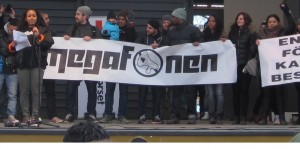by Julie Uldam and Anne Kaun
While Scandinavian countries may be coping with the Euro crisis relatively better than most other European countries, they are far from unaffected. Nonetheless, the mainstream media have represented Scandinavia and Sweden as prime examples of resilience at a governmental level (i.e. the ability of a national economy to withstand, adapt and overcome the financial crisis), disregarding the consequences of growing inequalities and the dismantling of welfare state. Consequently, reports on resilience at the civil society level (i.e. the ability of citizens and communities to withstand, adapt and overcome the financial crisis) remain largely absent from mainstream media reports. Instead, civil society initiatives that respond to the consequences of the crisis have to rely on self-representation and sharing of resources in online media. One example is the Swedish grassroots organisation, Megafonen.
In the mainstream media Scandinavia is generally represented as a prime example of how to survive the Euro crisis, and the myth of the Scandinavian welfare model remains dominant. While the crisis has certainly hit Scandinavia less hard than most European countries, marginalized groups in Swedish, e.g. in suburban areas have been confronted with an increasingly cold climate of austerity. With youth clubs closing down, social services being cut, public institutions moving out of the suburbs and rising rents, the atmosphere has become increasingly hostile. As a response, riots broke out in Stockholm’s suburbs this spring and soon spread in Stockholm and to other Swedish cities. Consequently, the European media had to put a long cultivated myth of the Scandinavian welfare model into question.
Until the uprisings, the situations and concerns of groups living in segregated suburban areas received relatively little attention in the European press. The Swedish grassroots organization Megafonen became a crucial platform for raising awareness on these issues. Megafonen also came to work as a platform for mobilization and sharing resources. In making visible the social circumstances that led to the riots and in providing a platform for mobilization and sharing resources, Megafonen facilitated resilience at a civil society level. Resilience refers to the ability to deal with adverse situations and to develop ways of sustaining communities, their people and infrastructures, in situations of crisis. Resilience at the level of civil society – civic resilience – is key to responses to crises beyond protest and fatalism, because it involves finding new (local) ways of (self-)organising and providing social services rather than only protesting against the ways in which austerity policies have reduced these to fund bailing out the banks.
Megafonen: facilitating civic resilience and social innovation
Megafonen was launched in 2008 at the initial height of the financial crisis as a grass-roots organization that works as a hub for young people in Stockholm’s suburbs so as to provide them with a voice and enable their engagement in local social issues brought about by the crisis. These include preserving a local football field, protests against large investment projects by the central administration that would spur gentrification, and fighting against the privatization of communal housing in suburbs with a high density of inhabitants with immigrant background, of high unemployment and a large number of school drop-outs. Megafonen relies on volunteers to provide its services both locally in Stockholm’s suburbs and online via social media platforms and their website. Offline, these include homework support, career advice and support for tenants facing top-down gentrification initiatives in their areas. Online, Megafonen provides a range of different resources, including reports and updates on local issues, possibilities for getting involved with existing initiatives or for getting help to start new ones, as well as links to documentaries, radio shows, music and readings that cover previous examples of civic engagement leading to social change (e.g. the Black Power movement’s struggles in the US for self-determination for black people in the 60s and 70s).
These resources invite civic resilience by offering avenues for involvement in community-driven initiatives to meet social needs that have been augmented or made more acute by the crisis and ensuing austerity measures. However, this shift of responsibility from the state to civil society is not unproblematic. European governments are increasingly promoting collaboration between business, public bodies and civil society in response to budget constraints brought about by the crisis. In doing so, they adopt a resource perspective civic engagement, calling for citizens (including ‘corporate’ citizens) to volunteer social services – on market terms rather than community-driven initiatives.
This raises questions about the preconditions and consequences of approaching citizenship as a resource, and how a shift of responsibility from the state to civil society can be made possible in sustainable, environmental, social and economic ways.
Megafonen – with its reports on the underlying causes of the riots (generally backgrounded in the mainstream press) and its mobilization efforts against the erosion of the welfare state – facilitates civic resilience through online media. However, it faces two major challenges: (1) it needs to gain resonance among wider publics (including institutional actors such as local councils and factions from its own constituency such as the Swedish housing association and the Swedish union of tenants) and (2) it needs resources (personal and economic) to sustain its efforts to alleviate the consequences of the crisis at a community level.
This blog is also featured on the nSICE website (network on Social Innovation and Civic Engagement).





Pingback: (No) Time for activism: the changing face of protest movements | Euro Crisis in the Press
Pingback: Civil society at the cross-roads | Euro Crisis in the Press
Pingback: The Euro crisis in online media: civic resilience and social innovation in Sweden | Network on Social Innovation & Civic Engagement